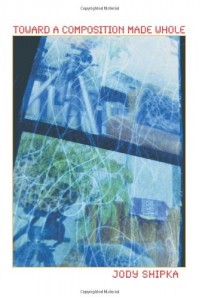 Toward a Composition Made Whole
Toward a Composition Made Whole
Author: Jody Shipka
Publisher: University of Pittsburgh Press, 2011
To many academics, composition still represents typewritten texts on 8.5” x 11” pages that follow rote argumentative guidelines. In Toward a Composition Made Whole, Jody Shipka views composition as an act of communication that can be expressed through any number of media and as a path to meaning-making. Her study offers an in-depth examination of multimodality via the processes, values, structures, and semiotic practices people employ everyday to compose and communicate their thoughts.
Shipka counters current associations that equate multimodality only with computer, digitized, or screen-mediated texts, which are often self-limiting. She stretches the boundaries of composition to include a hybridization of aural, visual, and written forms. Shipka analyzes the work of current scholars in multimodality and combines this with recent writing theory to create her own teaching framework. Among her methods, Shipka employs process-oriented reflection and a statement of goals and choices to prepare students to compose using various media in ways that spur their rhetorical and material awareness. They are encouraged to produce unusual text forms while also learning to understand the composition process as a whole. Shipka presents several case studies of students working in multimodal composition and explains the strategies, tools, and spaces they employ. She then offers methods to critically assess multimodal writing projects.
Toward a Composition Made Whole challenges theorists and compositionists to further investigate communication practices and broaden the scope of writing to include all composing methods. While Shipka views writing as crucial to discourse, she challenges us to always consider the various purposes that writing serves.
Reviews“Shipka addresses a profound need in composition studies, especially as we talk about (and talk around) multimodality, composition, new media, and more: to better contextualize how, when, where, and why composing happens in a way that can capture some of the vast complexities and nuances that emerge across composing tasks” (Danielle Nicole DeVoss, Michigan State University)
“Jody Shipka moves us to think of composition more holistically. She urges us to consider more multimodal compositions—the full range of representational expressions, from plays to ephemera to (memorably) ballet slippers. She considers the environments, moments, and physical demands of composition, a process carried out against the backdrop of complex lives. And she provides us the tools to apply these lessons in our own classrooms. A timely and thought-provoking book” (Clay Spinuzzi, University of Texas at Austin)
“With Toward a Composition Made Whole [Shipka] has published what I think is the most compelling study of student writers since Janet Emig’s Composing Processes of Twelfth Graders. Like Emig, she uses her study to extrapolate a powerful, enlightening process-model, one with the potential to turn writing classrooms into some of the most exciting spaces on campus” (College Composition and Communication)
“Riding the kairos-wave she has gathered, the author has offered us a chance to integrate the spirit and essence of multimodality into our courses and into our field. Indeed, we are provided a text worthy of any doctoral reading list, and one that should be a centerpiece of any composition scholar’s bookshelf. Shipka has given us a treatise for an important element of 21st-centurey composition and provided us with a solid and clear framework for a composition truly made whole. We would do well to embrace it” (Composition Studies)
“Shipka’s creative ideas, lucid prose style, and well-illustrated examples make Toward a Composition Made Whole a refreshing book to read. Its framework for teaching, researching, and assessing multimodal composing pushes us to think beyond typical conventions and orthodox pedagogical practices, enabling us to expand our understanding of ‘rhetoric,’ ‘writing’ and ‘technologies’” (Computer and Composition Online)
“Shipka challenges us not to get too enamored with technology-based assignments as the only way to make writing assignments relevant and meaningful to today’s students. She also sounds a needed call for intellectual tasks in writing courses that students find engaging, and a needed call for more writing process research” (College English)